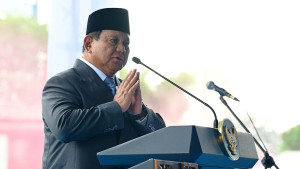Israel-Iran war sends oil prices soaring, pressures Indonesia’s economy: Expert
The outbreak of war between Israel and Iran in June 2025 has triggered a dramatic spike in global oil prices, surpassing US$100 per barrel, sending shockwaves through energy-importing nations like Indonesia, placing immense pressure on the country’s State budget and simultaneously threatening inflation and currency stability, an expert says.
“This is not just a price shock. It’s a direct threat to our economic resilience. Indonesia’s energy subsidies will balloon, widening the current account deficit and forcing the government to choose between raising fuel prices or slashing development spendin,” Syafruddin Karimi, a lecturer at the Department of Economics, Padang-based Andalas University, said on Sunday , June 15, 2025.
The military escalation in the Middle East, marked by missile exchanges and threats to close the strategic Strait of Hormuz, has sent markets into turmoil. The global stock market took a hit while energy-importing economies in Asia brace for a prolonged period of uncertainty.
Indonesia’s heavy reliance on imported oil means that rising crude prices translate swiftly into higher fuel subsidies. The government now faces a difficult policy crossroads: maintain consumer fuel prices and absorb the fiscal blow, or pass the burden onto the public by raising fuel prices − a politically risky move with inflationary consequences.
The war is not only reshaping the global geopolitical map, but also exposing the vulnerabilities of economies dependent on energy imports. As nations scramble to ensure energy security, Indonesia’s fiscal health hangs in the balance, caught in the crossfire of a conflict far from its borders but dangerously close to its economic core.
Israel attack
As reported by Guardian, a direct military conflict between Israel and Iran broke out on June 13, 2025, marking the most dangerous escalation in Middle Eastern geopolitics in over a decade. The exchange began when Israel launched a coordinated airstrike campaign, dubbed Operation Rising Lion, targeting key Iranian nuclear and military sites. Iran responded within hours with a barrage of missiles and drones in what it called Operation True Promise III, pushing both nations into open warfare.
At 3 a.m. local time on Friday, June 13, Israel deployed over 200 fighter jets in five aerial waves that struck more than 100 targets inside Iranian territory. The strikes focused on uranium enrichment facilities at Natanz, Isfahan, Fordow, and Khondab, as well as missile bases and IRGC (Islamic Revolutionary Guard Corp) leadership compounds.
“Israeli fighter jets inflicted extensive damage on Iran’s top nuclear facilities,” reported Business Insider, citing satellite imagery showing destroyed infrastructure at the Natanz complex.
Among the dead were senior Iranian commanders, including IRGC leader Hossein Salami and Armed Forces Chief of Staff Mohammad Bagheri, as well as nuclear scientists Fereydoon Abbasi-Davani and Mohammad Mehdi Tehranchi. Civilian casualties were also reported in western Tehran and Isfahan.
The Economic Times quoted an Israeli military source stating, “This was a preemptive strike to degrade Iran’s nuclear capabilities before they reached a critical threshold.”
Iran retaliates
On the same day, shortly after nightfall, Iran retaliated with a coordinated launch of over 150 ballistic missiles and more than 100 drones aimed at Israeli territory, including Jerusalem, Tel Aviv, and Haifa.
“Iran launched a large-scale retaliation named Operation True Promise III,” reported Guardian, noting that the barrage continued into Saturday morning.
In Tel Aviv, missile strikes damaged residential buildings in the Ramat Gan district, killing at least three civilians and injuring dozens more. In Haifa, key infrastructure such as ports and oil refineries were hit, causing widespread fires and power outages.
Iran also unveiled a new weapon during the attack: the Haj Qassem guided ballistic missile, named after the late Quds Force General Qassem Soleimani. “The launch of the Haj Qassem missile marks a new chapter in Iran’s long-range strike capability,” reported The Economic Times.
Already have an account? Sign In
-
Start reading
Freemium
-
Monthly Subscription
20% OFF$29.75
$37.19/MonthCancel anytime
This offer is open to all new subscribers!
Subscribe now -
Yearly Subscription
33% OFF$228.13
$340.5/YearCancel anytime
This offer is open to all new subscribers!
Subscribe now







